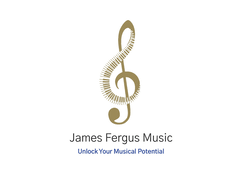
Services > Ear Training for Classical Pianists
Ear Training for Classical Pianists in Norwich
Are you a beginner pianist in Norwich looking to improve your ear training skills? Our online ear training classes for beginners are here to provide you with the tools you need to develop your abilities and progress at your own pace. Our expert instructor, James Fergus, will guide you through the basics and beyond, teaching you essential skills such as identifying notes and chords by ear. Sign up for a free in-person ear training class today and start on the path to becoming the pianist you've always wanted to be!
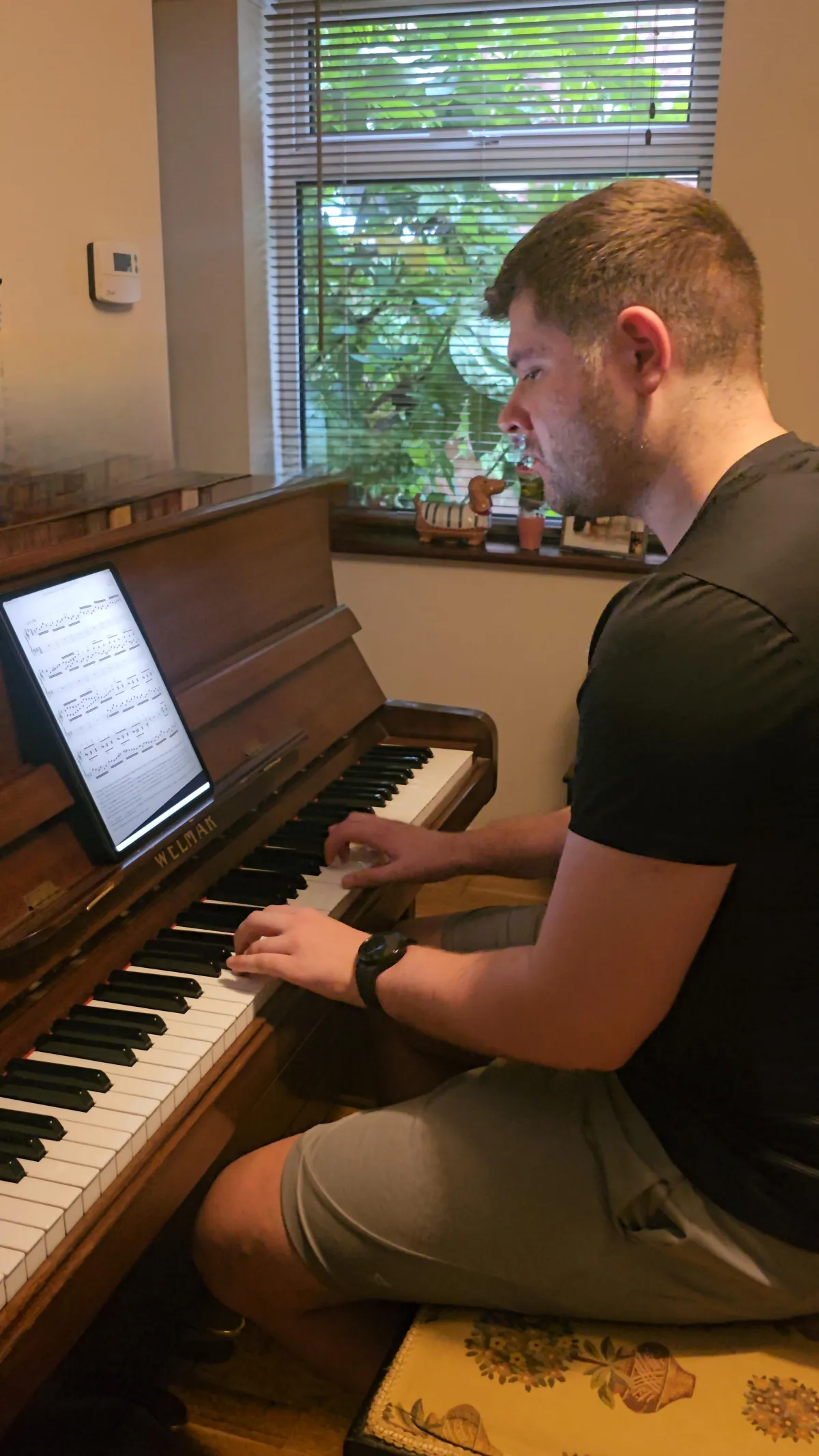
What is Ear Training for Classical Pianists
Ear training is the process of developing the ability to identify, transcribe, and replicate sounds, which is essential for becoming a proficient pianist. It is the foundation of all music education, and it is critical for developing a good sense of pitch and rhythm, as well as the ability to transcribe music by ear.
For pianists, ear training helps to improve the ability to identify and play notes, chords, and melodies by ear, without the use of sheet music. This allows pianists to develop their improvisational skills, play by ear, and compose their own music. It also helps pianists to become more proficient at reading sheet music, as they are able to hear the music in their head before playing it on the piano.
Additionally, ear training helps pianists to better understand the concepts of music theory, such as scales, chords, and intervals, as they learn to identify them by ear. It also improves the ability to sing in tune and to hear and play in harmony with other musicians. This is especially important for your ABRSM Aural Tests!
In summary, ear training is essential for pianists of all skill levels. It helps to improve overall musicianship, and it allows pianists to become more proficient at reading sheet music, improvising, composing, and playing in harmony with others. Without proper ear training, pianists may struggle to fully understand and enjoy the beauty of music.

Benefits of Ear Training for Classical Pianists
Ear training is an essential aspect of becoming a proficient musician. It allows you to develop your ability to identify, transcribe, and replicate sounds, which improves your overall musicianship and enhances your understanding of music. Here are some of the key benefits of ear training:
✓ Improved Pitch Recognition: Ear training helps you identify and distinguish different notes and pitches, which is essential for reading sheet music and playing by ear.
✓Increased Musical Memory: By training your ears to recognize and remember melodies and chord progressions, you can improve your musical memory, which can be helpful for sight-reading and improvising.
✓Enhanced Musical Creativity: Ear training allows you to develop your musical imagination, which can inspire new compositions and arrangements.
✓Better Transcription Skills: Through ear training, you can learn to transcribe music by listening to recordings and reproducing them by playing an instrument.
✓Better Music Theory Understanding: Ear training can help you better understand the concepts of music theory, such as scales, chords, and intervals, as you learn to identify them by ear.
Overall, ear training is a valuable skill for any musician, whether you are a beginner or an experienced player. By dedicating time to ear training, you can improve your overall musicianship and reach new levels of creativity and expression in your playing.

Services > Ear Training for Classical Pianists

Ear Training for Classical Pianists in Norwich
Are you a beginner pianist in Norwich looking to improve your ear training skills? Our online ear training classes for beginners are here to provide you with the tools you need to develop your abilities and progress at your own pace. Our expert instructor, James Fergus, will guide you through the basics and beyond, teaching you essential skills such as identifying notes and chords by ear. Sign up for a free in-person ear training class today and start on the path to becoming the pianist you've always wanted to be!
What is Ear Training for Classical Pianists?
Ear training is the process of developing the ability to identify, transcribe, and replicate sounds, which is essential for becoming a proficient pianist. It is the foundation of all music education, and it is critical for developing a good sense of pitch and rhythm, as well as the ability to transcribe music by ear.
For pianists, ear training helps to improve the ability to identify and play notes, chords, and melodies by ear, without the use of sheet music. This allows pianists to develop their improvisational skills, play by ear, and compose their own music. It also helps pianists to become more proficient at reading sheet music, as they are able to hear the music in their head before playing it on the piano.
Additionally, ear training helps pianists to better understand the concepts of music theory, such as scales, chords, and intervals, as they learn to identify them by ear. It also improves the ability to sing in tune and to hear and play in harmony with other musicians.
In summary, ear training is essential for pianists of all skill levels. It helps to improve overall musicianship, and it allows pianists to become more proficient at reading sheet music, improvising, composing, and playing in harmony with others. Without proper ear training, pianists may struggle to fully understand and enjoy the beauty of music.
Benefits of Ear Training for Classical Pianists

Ear training is an essential aspect of becoming a proficient musician. It allows you to develop your ability to identify, transcribe, and replicate sounds, which improves your overall musicianship and enhances your understanding of music. Here are some of the key benefits of ear training:
✓ Improved Pitch Recognition: Ear training helps you identify and distinguish different notes and pitches, which is essential for reading sheet music and playing by ear.
✓Increased Musical Memory: By training your ears to recognize and remember melodies and chord progressions, you can improve your musical memory, which can be helpful for sight-reading and improvising.
✓Enhanced Musical Creativity: Ear training allows you to develop your musical imagination, which can inspire new compositions and arrangements.
✓Better Transcription Skills: Through ear training, you can learn to transcribe music by listening to recordings and reproducing them by playing an instrument.
✓Better Music Theory Understanding: Ear training can help you better understand the concepts of music theory, such as scales, chords, and intervals, as you learn to identify them by ear.
Overall, ear training is a valuable skill for any musician, whether you are a beginner or an experienced player. By dedicating time to ear training, you can improve your overall musicianship and reach new levels of creativity and expression in your playing.
Our Students Taking Lessons at James Fergus Music
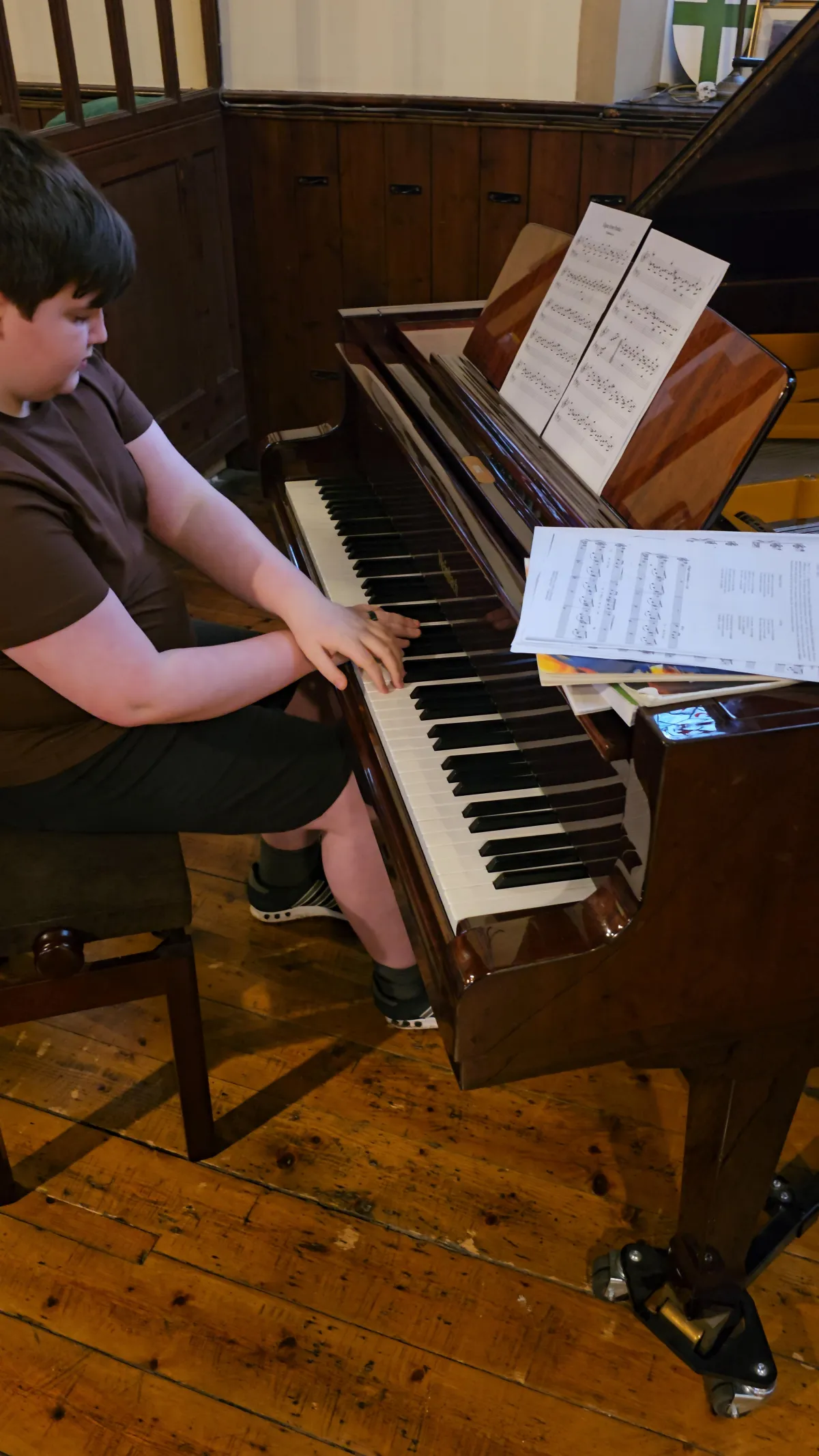
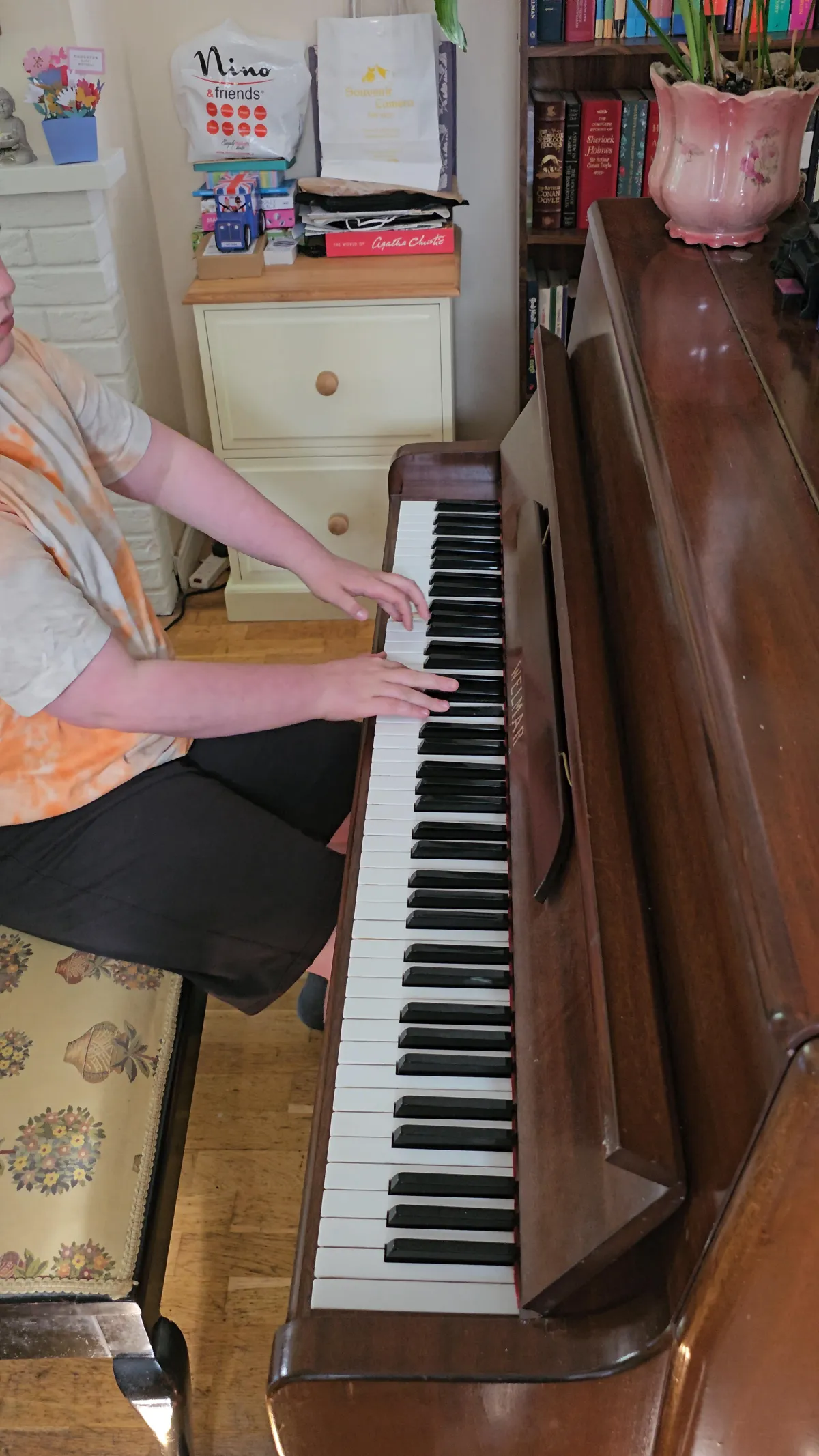
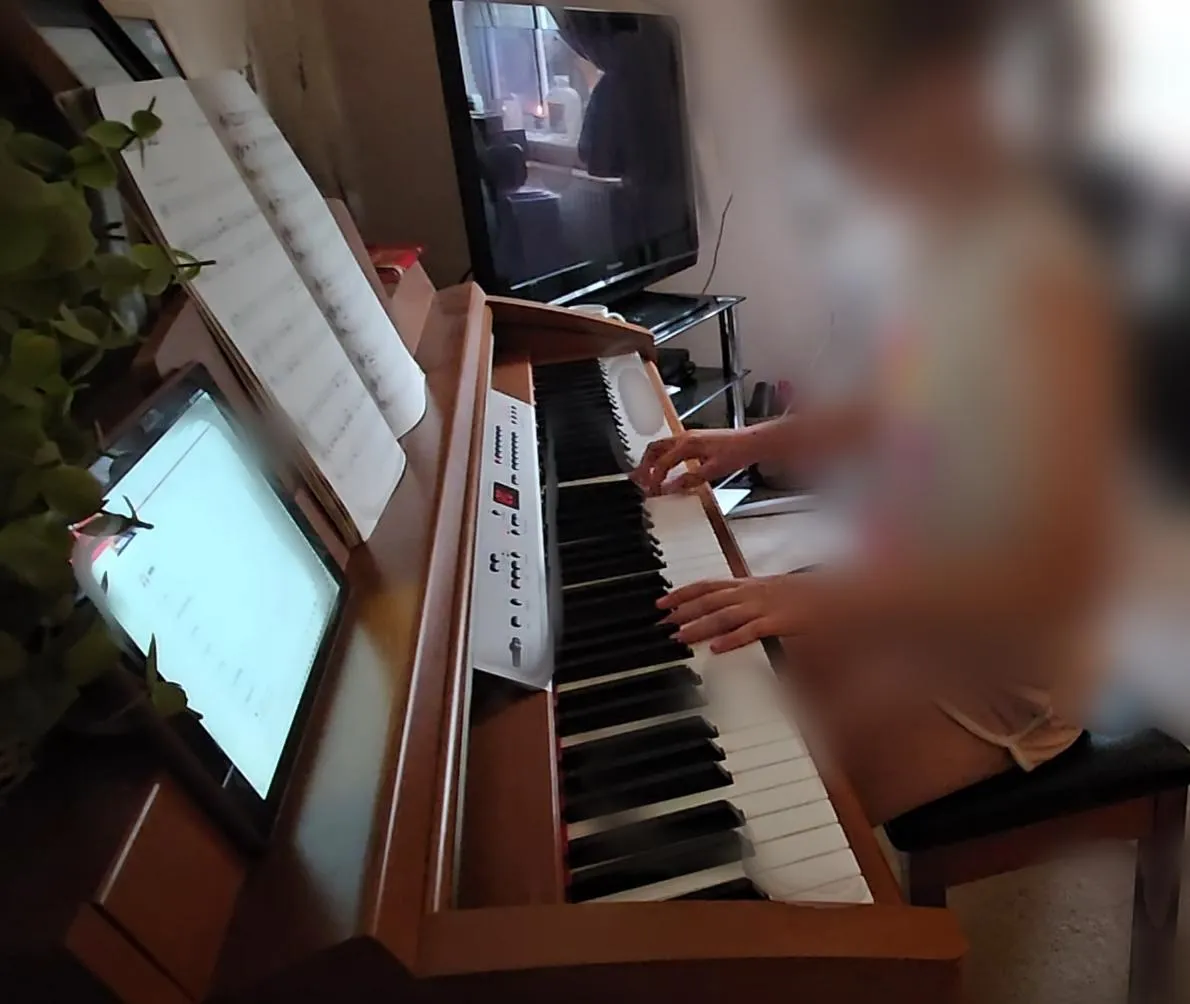
Our Students Taking Lessons at James Fergus Music



The 3-Step Process For Our
In-Person Piano Lesson
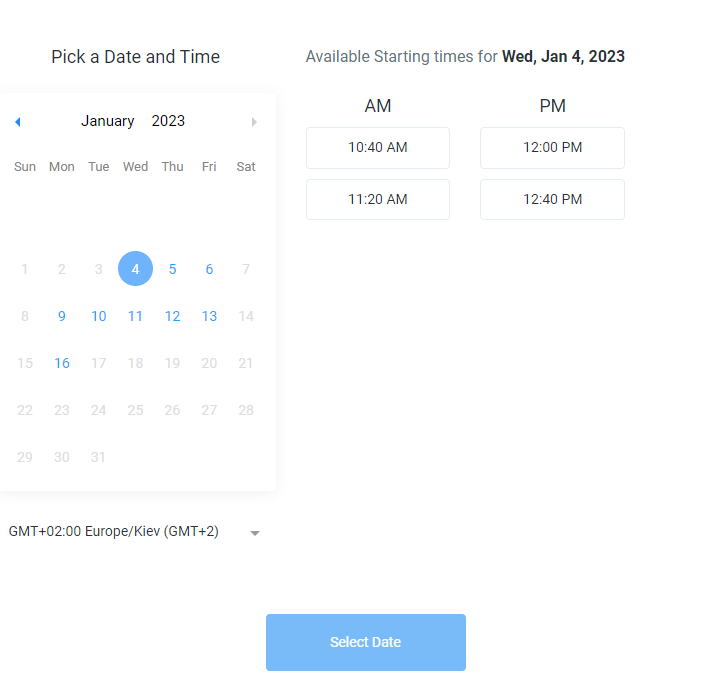
Schedule Your Free Session
Congratulations on taking the first step towards becoming a skilled pianist! The next step is to book your complimentary piano lesson on our website calendar by clicking the reservation button and selecting a time that suits you best.
We frequently update our calendar with available slots, so you have a range of options to choose from. Don't hesitate, schedule your lesson today and embark on your path to piano mastery!

Log in to Your Online Piano Lesson
Now that you've booked your free piano class, it's time to log in and prepare for your online class! Make sure to log in on the platform on the day and time of your booked slot, as our schedule is tight and we want to make sure you get the most out of your class.
Online Piano Lessons have never been easier!
We can't wait to see you and help you take your piano skills to the next level at James Fergus Music!
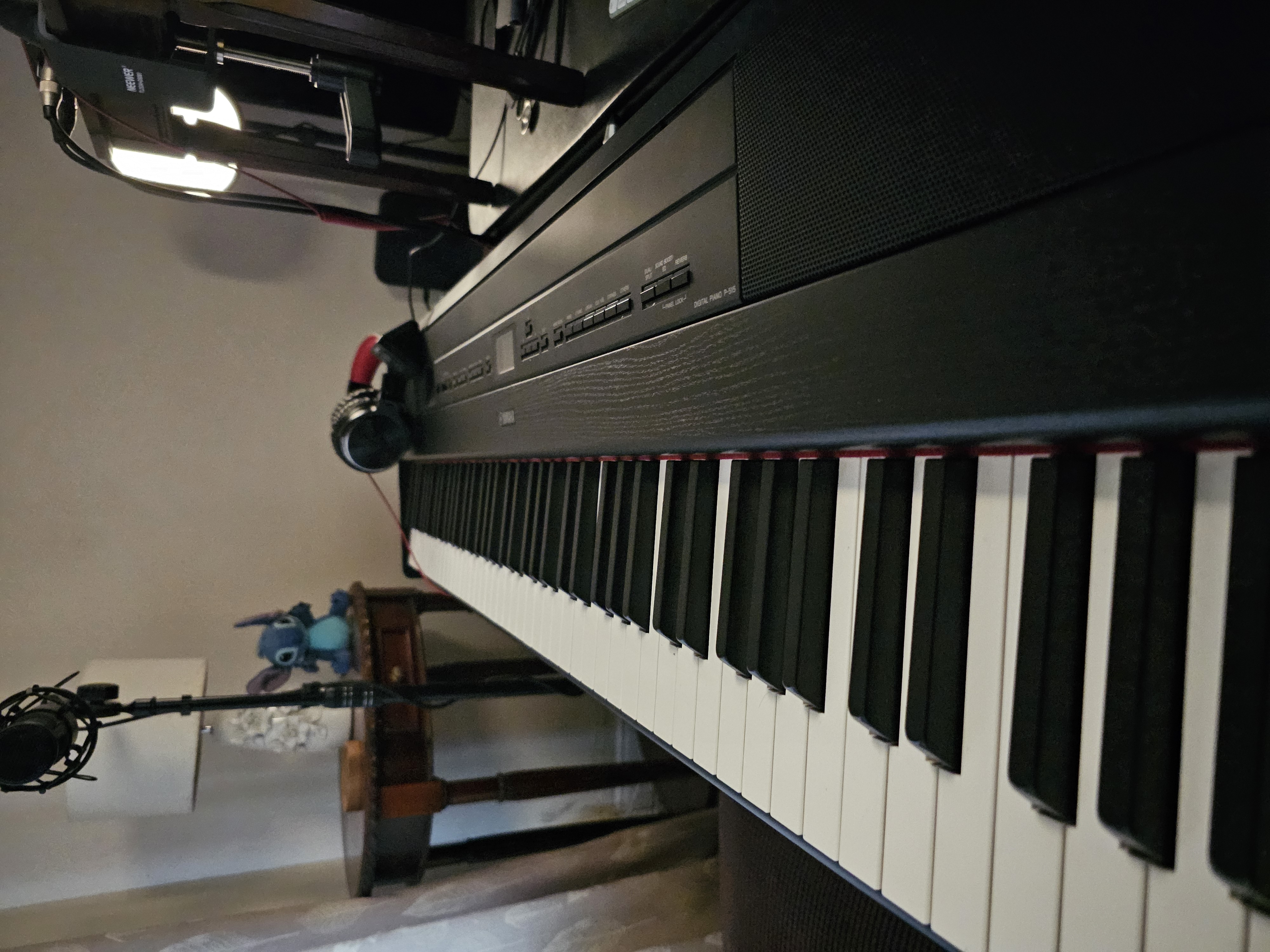


Experience a transformative lesson with us at James Fergus Music!
We're thrilled to have you join us for your piano class at James Fergus Music! With James Fergus leading the way, you'll have an enjoyable experience and start playing music right away.
James is an experienced piano instructor and knows exactly how to help you reach your musical goals. Trust us, you're in great hands and we can't wait to see you make a breakthrough in your piano journey at James Fergus Music. See you soon!
The 3-Step Process For
Ear Training for Classical Pianists
Schedule Your Free Session

Congratulations on taking the first step towards becoming a skilled pianist! The next step is to book your complimentary piano lesson on our website calendar by clicking the reservation button and selecting a time that suits you best.
We frequently update our calendar with available slots, so you have a range of options to choose from. Don't hesitate, schedule your lesson today and embark on your path to piano mastery!

Log in to Your Online Piano Lesson

Now that you've booked your free piano class, it's time to log in and prepare for your online class! Make sure to log in on the platform on the day and time of your booked slot, as our schedule is tight and we want to make sure you get the most out of your class.
Online Piano Lessons have never been easier!
We can't wait to see you and help you take your piano skills to the next level at James Fergus Music!

Experience a transformative lesson with us at James Fergus Music!

We're thrilled to have you join us for your piano class at James Fergus Music! With James Fergus leading the way, you'll have an enjoyable experience and start playing music right away.
James is an experienced piano instructor and knows exactly how to help you reach your musical goals. Trust us, you're in great hands and we can't wait to see you make a breakthrough in your piano journey at James Fergus Music. See you soon!
Things To Know About Ear Training for Classical Pianists
There is no specific age limit for starting piano lessons.
Many adults believe that learning to play the piano is something best left for children, but the truth is that there is no age limit for starting piano lessons. In fact, adults often bring a unique set of advantages to the learning process, such as a mature understanding of music, a strong sense of discipline, and clear personal goals. Whether you're in your 30s, 50s, or beyond, it's never too late to embark on the rewarding journey of learning to play the piano.
At James Fergus Music, we specialise in teaching adult beginners, understanding the specific challenges and opportunities they face. Adult piano lessons are tailored to fit your busy lifestyle and learning pace, ensuring that each lesson is both enjoyable and effective. With a focus on your musical preferences and goals, we provide patient, flexible instruction that helps you achieve your dream of playing the piano, proving that age is truly just a number when it comes to making beautiful music.
Not being able to read sheet music is not a requirement to play the piano, there are other ways to learn and master the instrument.
Being able to read sheet music can be beneficial for pianists, but it is not an absolute requirement for learning piano. Some students may prefer to learn by listening or using chord charts and other materials that don't involve sheet music reading. However, learning to read sheet music can enhance a student's understanding of music and expand their repertoire. Many piano teachers will often teach sheet music reading alongside other piano-playing skills and it can be developed gradually as the student progresses.
How long it will it take you to learn varies from person to person.
The time it takes to learn piano can differ among individuals. Some may learn the fundamentals, such as posture and hand positioning, in a few months while it might take others longer. With consistent practice and quality instruction, one can improve their piano playing skills over time. It may take some time to learn more challenging pieces, but with dedication and practice, progress can be made.
Creating a consistent practice schedule and fostering a positive learning atmosphere in the home environment are key for piano success.
For adult learners, establishing a consistent practice schedule and creating a positive learning atmosphere at home are crucial for achieving success in piano playing. Adults often juggle numerous responsibilities, making it essential to carve out dedicated time for practice to ensure steady progress. Setting up a comfortable and distraction-free practice space can greatly enhance focus and enjoyment. Additionally, fostering a supportive and encouraging environment helps maintain motivation and makes the learning process more fulfilling. By integrating regular practice into your daily routine and cultivating a positive mindset, you'll find that practising the piano becomes a rewarding and achievable goal.
Piano lessons can teach students the correct posture and hand positioning, finger exercises, scales, arpeggios, chord progressions, and sheet music interpretation.
Piano lessons provide a comprehensive set of technical and theoretical knowledge required for playing the piano, including proper posture and hand positioning, finger exercises, scales, arpeggios, chord progressions, and sheet music interpretation.
Through working on pieces, students will also improve their performance skills, musical expression and composition understanding. The curriculum may also include elements of music theory, ear training, and sight-reading to augment musical comprehension. The lessons will be tailored to the student's level, goals, and interests, determining the content and pace of instruction.
Having natural musical ability is not necessary to play the piano.
Being naturally gifted is not a pre-requisite to learn piano. Some may find it easier to learn, others may have to put in more effort to improve. However, with persistence and dedication, anyone can attain proficiency in playing the piano. A skilled piano teacher can guide and assist you in honing your skills, regardless of your initial level.
Contact Us
Open Hours
Social Media
Monday - Friday: 8:00 AM - 5:00 PM
Saturday: 8:00 AM - 5:00 PM
Sunday: 8:00 AM - 5:00 PM
Things To Know About Ear Training for Classical Pianists
There is no specific age limit for starting piano lessons.
Many adults believe that learning to play the piano is something best left for children, but the truth is that there is no age limit for starting piano lessons. In fact, adults often bring a unique set of advantages to the learning process, such as a mature understanding of music, a strong sense of discipline, and clear personal goals. Whether you're in your 30s, 50s, or beyond, it's never too late to embark on the rewarding journey of learning to play the piano.
At James Fergus Music, we specialise in teaching adult beginners, understanding the specific challenges and opportunities they face. Adult piano lessons are tailored to fit your busy lifestyle and learning pace, ensuring that each lesson is both enjoyable and effective. With a focus on your musical preferences and goals, we provide patient, flexible instruction that helps you achieve your dream of playing the piano, proving that age is truly just a number when it comes to making beautiful music.
Not being able to read sheet music is not a requirement to play the piano, there are other ways to learn and master the instrument.
Being able to read sheet music can be beneficial for pianists, but it is not an absolute requirement for learning piano. Some students may prefer to learn by listening or using chord charts and other materials that don't involve sheet music reading. However, learning to read sheet music can enhance a student's understanding of music and expand their repertoire. Many piano teachers will often teach sheet music reading alongside other piano-playing skills and it can be developed gradually as the student progresses.
How long it will it take you to learn varies from person to person.
The time it takes to learn any skill can differ among individuals. Some may learn the fundamentals, such as posture and hand positioning, in a few months while it might take others longer. With consistent practice and quality instruction, one can improve their piano playing skills over time. It may take some time to learn more challenging pieces, but with dedication and practice, progress can be made.
Creating a consistent practice schedule and fostering a positive learning atmosphere in the home environment are key for piano success.
For adult learners, establishing a consistent practice schedule and creating a positive learning atmosphere at home are crucial for achieving success in piano playing. Adults often juggle numerous responsibilities, making it essential to carve out dedicated time for practice to ensure steady progress. Setting up a comfortable and distraction-free practice space can greatly enhance focus and enjoyment. Additionally, fostering a supportive and encouraging environment helps maintain motivation and makes the learning process more fulfilling. By integrating regular practice into your daily routine and cultivating a positive mindset, you'll find that practising the piano becomes a rewarding and achievable goal.
Piano lessons can teach students the correct posture and hand positioning, finger exercises, scales, arpeggios, chord progressions, and sheet music interpretation.
Piano lessons provide a comprehensive set of technical and theoretical knowledge required for playing the piano, including proper posture and hand positioning, finger exercises, scales, arpeggios, chord progressions, and sheet music interpretation.
Through working on pieces, students will also improve their performance skills, musical expression and composition understanding. The curriculum may also include elements of music theory, ear training, and sight-reading to augment musical comprehension. The lessons will be tailored to the student's level, goals, and interests, determining the content and pace of instruction.
Having natural musical ability is not necessary to play the piano.
Being naturally gifted is not a pre-requisite to learn piano. Some may find it easier to learn, others may have to put in more effort to improve. However, with persistence and dedication, anyone can attain proficiency in playing the piano. A skilled piano teacher can guide and assist you in honing your skills, regardless of your initial level.
Contact Us
07548 054025
Norwich Norfolk NR2
Service Hours
Monday - Friday: 8:00 AM - 5:00 PM
Saturday: 8:00 AM - 5:00 PM
Sunday: 8:00 AM - 5:00 PM
Social Media





